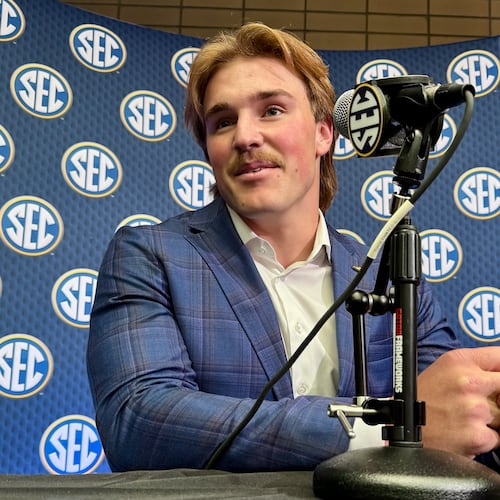Two distinctly different college basketball worlds will collide Saturday afternoon at Rupp Arena in Lexington, Ky.
On one side of the scorer’s table will be the regal Kentucky Wildcats, basketball royalty from way back who place players in the NBA like the Army recruits foot soldiers. On the other side will be the Georgia Bulldogs, who fight like mad just to keep the state’s best players at home and modestly hope to make the NCAA tournament every fourth year or so.
Remarkably, they find themselves at the same place at the moment, at least in conference play. Both are 4-1 and tied for second in the SEC. After that, the similarities are exhausted.
The Wildcats are 14-4 overall and rank 14th in the nation. Georgia is 10-7 and unranked.
“It’s still basketball,” Georgia coach Mark Fox said Friday. “It still comes down to what happens between the lines.”
Fox and Kentucky coach John Calipari arrived at their respective schools at the same time. But the main reason the Wildcats have averaged nearly 31 wins per season (and won one national championship) the previous four years, compared with the Bulldogs’ 16, is the talent they’ve put on the floor.
It’s no secret how Calipari gets the best players to come to Lexington. He has embraced the NBA rule that requires players to play at least one season in college — or be a year removed from high school — before they’re eligible for the draft. Under Calipari’s watch, the Wildcats have had 17 players drafted in four years, all but four of them in the first round.
In 2010 alone, Kentucky had five players taken in the first round. Calipari proclaimed it the “greatest day in the history of the program.”
In the same span, Georgia has had three players drafted, with one taken in the first round. Guard Kentavious Caldwell-Pope was a lottery pick last year, going to the Detroit Pistons with the eighth selection. He would have been a junior this season.
“Well, I don’t think it’s necessarily the model that Kentucky wants to use,” Fox said. “I think it’s a byproduct of the rule, quite frankly. The fact that guys only have to go to school for one year and leave, guys at that level are going to leave first chance they get because there’s so much money that they’re assured of.”
But that’s not exactly the collegiate mission. In fact, former Kentucky President Lee T. Todd expressed some uneasiness about the one-and-done model in 2010. But the inherent competitiveness of Big Blue basketball kept Todd from barring the practice.
“If you don’t recruit them, you’ll play against them very likely,” Todd said. “It’s a system problem, I think.”
Fox agrees with that. He doesn’t begrudge Kentucky and programs of that ilk for snatching up as many NBA hopefuls as possible. It would be better, he said, if there were more players of that caliber to go around.
“It’s a bad rule for everybody else,” Fox said. “Let’s say that they have to stay in school three years, like baseball, and they could go right out of high school if they wanted to, then a great program like Kentucky wouldn’t have so many scholarships available to give five or six a year. They’d have to sprinkle guys around to other places.”
Like a lot of Division I coaches, Fox prefers the baseball draft model with regard to college eligibility. In baseball, prospects can be drafted directly out of high school, but if they don’t sign a professional contract and decide to go to college, they must complete three seasons before becoming draft eligible again.
“I’d love to have the baseball rule,” Fox said. “If they want to go pro out of high school, let them go. If they want to go to college, let’s commit to three years. It will make our game better, and I think it will make the NBA game better.”
Georgia junior Marcus Thornton, who was “Mr. Georgia Basketball” when he graduated from Westlake High, had a scholarship offer to Kentucky.
“It just is what it is,” said Thornton, who has had three knee surgeries in three years. “It’s great for a lot of kids who are looking for that opportunity. … But I was focused on getting an education and all the great things about going here. That’s what I was focused on. Not that you can’t get a good education at Kentucky. It was more about what Georgia had, not necessarily what Kentucky had or what Kentucky does.”
Considering the talent disparity, the Bulldogs have held up reasonably well of late against the giant that is Kentucky basketball. They won 72-62 last year in Athens and logged victories five times in the previous six seasons. But that has made only a tiny dent in the overall ledger, which has the Wildcats winning 115 of 141 games.
“They’re good,” Calipari said of the Bulldogs. “I told Mark, he’s going a great job. They’re playing exactly how they have to play to win: guards scoring, shooting 3’s when they need to, plus-10 rebounding in our league. They grind it out. One team gave them trouble: Florida. At Florida. If that game was at Georgia, it’d probably be a two-point game. … Other than that, they’ve weathered every storm.”
About the Author
Keep Reading
The Latest
Featured


